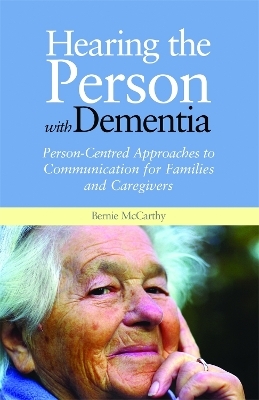
Hearing the Person with Dementia
Jessica Kingsley Publishers (Verlag)
978-1-84905-186-6 (ISBN)
Losing the ability to communicate can be a frustrating and difficult experience for people with dementia, their families and carers. As the disease progresses, the person with dementia may find it increasingly difficult to express themselves clearly, and to understand what others say.
Written with both family and professional carers in mind, this book clearly explains what happens to communication as dementia progresses, how this may affect an individual's memory, language and senses, and how carers might need to adapt their approach as a result. Advocating a person-centred approach to dementia care, the author describes methods of verbal and non-verbal communication, techniques for communicating with people who can not speak or move easily, and strategies for communicating more effectively in specific day-to-day situations, including at mealtimes, whilst helping the person with dementia to bathe or dress, and whilst out and about. Exercises at the end of each chapter encourage the carer to reflect on their learning and apply it to their own circumstances, and guidelines for creating a life story with the person with dementia as a means of promoting good communication are also included.
This concise, practical book is essential reading for family caregivers, professional care staff, and all those who work with, or who are training to work with, people with dementia.
Bernie McCarthy is the founder of McCarthy Psychology Services, and is a registered clinical psychologist with a Master of Arts in Clinical Psychology from Melbourne University. He is also a Member of the Australian Psychological Society and the College of Clinical Psychologists. Bernie is a trainer in Dementia Care Mapping and conducts staff training in dementia care and other aspects of psychological wellbeing and culture change in health and aged care throughout Australia.
Introduction. 1. Communication. Sometimes it's a struggle. Dementia and the brain. Exercise 1.1. 2. The Person-centred Way - VIPS. VIPS - Value. Exercise 2.1. VIPS - Individual. Exercise 2.2. VIPS - Perspective. Exercise 2.3. VIPS - Social. Exercise 2.4. 3. Components of Communication. Empathy, imagination and defensiveness. Verbal communication. Exercise 3.1. Nonverbal communication. Exercise 3.2. 4. Relating with People who Cannot Speak or Move. Managing our own needs. Exercise 4.1. 5. Specific Situations. In the shower. At mealtimes. Dressing. Going to the toilet. Going out. Getting bored. Making mistakes. Exercise 5.1. 6. Caring About You. When you have reached your limit. Staying away from your limit. Keeping up your social life. Daily routine with space for your needs. Carers get depressed sometimes. What resources do you have? Exercise 6.1. Conclusion. Appendix. Signs of well-being. Signs of ill-being. References. Index.
| Erscheint lt. Verlag | 15.1.2011 |
|---|---|
| Zusatzinfo | 1 line drawing |
| Verlagsort | London |
| Sprache | englisch |
| Maße | 136 x 214 mm |
| Gewicht | 148 g |
| Themenwelt | Sachbuch/Ratgeber ► Gesundheit / Leben / Psychologie ► Krankheiten / Heilverfahren |
| Medizin / Pharmazie ► Medizinische Fachgebiete ► Geriatrie | |
| Sozialwissenschaften ► Pädagogik ► Sozialpädagogik | |
| Sozialwissenschaften ► Soziologie | |
| ISBN-10 | 1-84905-186-0 / 1849051860 |
| ISBN-13 | 978-1-84905-186-6 / 9781849051866 |
| Zustand | Neuware |
| Haben Sie eine Frage zum Produkt? |
aus dem Bereich


